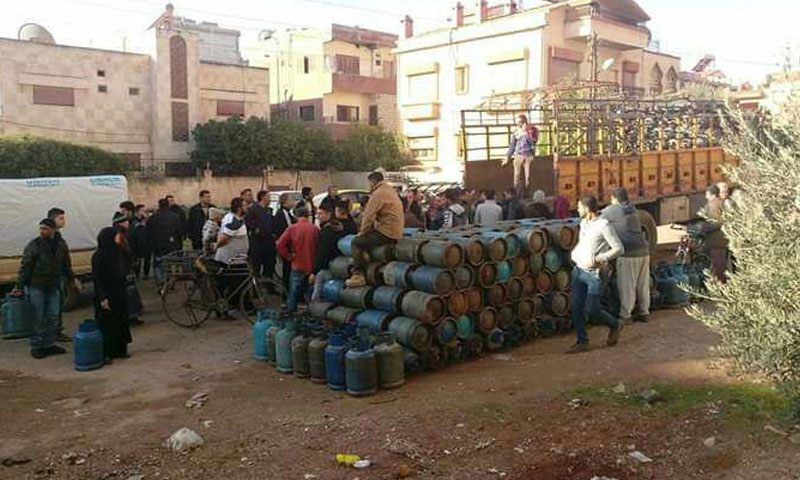



The distribution of industrial gas in the province of Daraa is limited to the city’s industrial establishments and restaurants, at the expense of the countryside. That is what led to the disproportion in the general production costs between rural and urban industrialists, tilting the balance towards the urban ones.
Meanwhile, restrictions on gas distribution via text messages caused its disappearance from local markets and increased its prices.
At the beginning of last February, the Ministry of Oil and Mineral Resources of the Syrian regime initiated a new mechanism for distributing Liquefied Petroleum Gas (LPG) cylinders for domestic uses through the “Smart card” system.
Citizens need only to wait for an SMS message, informing them to receive LPG cylinders within 24 hours of receiving the message. However, this new distribution mechanism was problematic with reverse impacts on the industrial facilities owners in rural Daraa who do not have access to the industrial gas.
Since the restriction of LPG cylinders distribution via the smart card, and with the activation of the SMS messages service, the price of a single cylinder has amounted to nearly 20,000 Syrian Pounds (SYP – around -18 USD).
Owners of restaurants, small enterprises, and bakeries in rural Daraa were adversely affected for they need gas in large quantities on a daily basis and they cannot secure them. As a result, some restaurant owners must suspend their works or shut down their restaurants completely.
The industrial LPG gas is the gaseous material manufactured for licensed industrial uses. Both industrial and domestic LPG cylinder contains a mixture of commercial butane and commercial propane having both saturated and unsaturated hydrocarbons. Nevertheless, the industrial LPG used in Syria is twice the size of a domestic LPG, which reduces the general production costs paid by the industrialists.
A chicken-based restaurant owner in rural Daraa (preferred not to be named for security reasons) closed down his place due to the acute shortage crisis of the domestic gas and the difficulties in providing it if available. Besides, the situation was worsened by the rise in chicken prices, along with that of essential ingredients for cooking.
The restaurant owner told Enab Baladi that he could no longer bear the daily losses of his restaurant, which receives minimum customer visits; therefore, he shut it down.
Abu Ammar, a pastry shop owner in rural Daraa, who refused to reveal his full name for security concerns, is also suffering from the same problem of gas shortage.
The almost disappearance of LPG cylinders and the restriction of their distribution to the registered owners only affected the production cost of the desserts shop.
Abu Ammar mentioned that his shop takes up almost three LPG cylinders per month, which makes it challenging to keep working amid the gas shortage crisis in Daraa province.
Abu Ammar told Enab Baladi that even the licensed industrial establishments in rural Daraa do not have access to a gas supply, widening the disproportion gap of the general production costs, and affecting the price-based competition between the city and countryside of Daraa province.
Hassan al-Saeed, the director of the state Hydrocarbons Company in Daraa, confirmed in a statement to the state-run newspaper al-Baath, that LPG cylinders are available for all industrial facilities and restaurants with a number that amounts to 4,500 cylinders.
Nonetheless, restaurants’ owners and industrialists of rural Daraa contacted by Enab Baladi confirmed that the industrial establishments in the cities of Daraa are the sole beneficiary of the state’s distributed gas.
Abu Ammar believes that the solution lies in the distribution of industrial gas via the “smart card” system at a fixed price similarly to the allocated distribution of subsidized fuel which is sold at 250 SYP ( 0.23 USD) per liter and 450 SYP (0.419 USD) for the unsubsidized fuel.
He referred to the possibility of selling industrial gas in the market via the smart card and at a reasonable price, highlighting that the subsidized LPG cylinder costs less than 2400 SYP (around 2 USD).
The solution proposed by Abu Ammar might be useful to the previously mentioned owner of the chicken-based restaurant, who resides in rural Daraa. He used to exchange the empty gas cylinder with a full one at the cost of 20,000 SYP (18 USD).
On the other hand, restaurants, and shops in Daraa’s cities were given LPG cylinders (double the size of the domestic ones) for industrial uses for 9,000 SYP (8 USD).
In conclusion, the automated solution of distributing industrial LPG cylinders via the smart card might lessen the product’s selling price in the local markets.
The smart card solution will also end the “supremacy” of the cities’ industrialists that gives them an unfair advantage in the market, as well as, it will shut the door in the face of their price manipulation causing huge losses to the owners of restaurants and industrial facilities in the countryside of Daraa.
if you think the article contain wrong information or you have additional details Send Correction